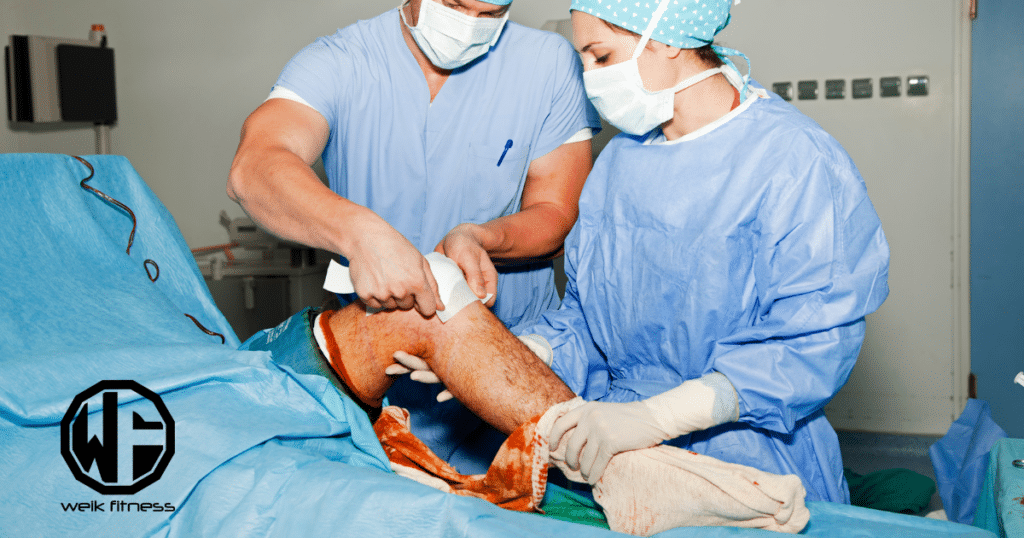Exercise and Avoid Knee Surgery
Anyone who has had a meniscal tear requiring knee surgery knows they never want to go through knee surgery again!!! And now they might not have to.
Researchers are saying that supervised exercise therapy might be as effective as having surgery for middle-aged individuals. This might be a relief to many of you as the occurrence of a meniscal tear has become more and more common. In fact, statistics show that on average around two million people across the globe go under the knife to fix knee problems (knee surgery) every year with many individuals finding little benefit.
Disclaimer: This article is for informational purposes only and is not meant to treat or diagnose any condition. It is recommended that you speak with your doctor before starting any exercise program, changing your daily nutrition, or adding any supplements to your regimen.
Table of contents

What Can Causes Meniscal Tear?
A meniscal tear is an injury to the meniscus, which is a piece of cartilage in the knee that cushions and stabilizes the joint. In some cases, a meniscal tear may require knee surgery.
The causes of a meniscal tear can include:
- Trauma or Injury: This is the most common cause, especially in athletes. Sudden twists or rotations of the knee, often while the foot is firmly planted, can lead to a tear. This type of injury is common in sports like football, basketball, and soccer.
- Degeneration: Over time, the meniscus can weaken and become more prone to tearing, especially in older adults. Degenerative tears are often caused by minor events, such as getting up from a squatting position, rather than a specific injury.
- Repetitive Stress: Activities that involve repetitive knee stress, such as squatting, kneeling, or heavy lifting, can contribute to the wear and tear of the meniscus, leading to a tear over time.
- Age: The risk of a meniscal tear increases with age due to the degeneration of the meniscal tissue, which becomes more brittle and less flexible.
- Structural Abnormalities: Some people may have structural abnormalities in their knee that can predispose them to meniscal tears. For example, an abnormal alignment of the knee joint can put extra stress on the meniscus.
- Obesity: Excess body weight can put additional stress on the knee joints, increasing the risk of meniscal tears.
- Previous Knee Injuries: Having had previous injuries to the knee can weaken the meniscus and increase the likelihood of a tear.
Avoid Knee Surgery at All Cost!

Researchers out of Norway and Denmark gathered 140 adults from two different hospitals to be part of a new study looking at knee problems. They made sure that the subjects were suffering from degenerative meniscal tears by using an MRI scan to verify the problem. The average age of the individuals in the study was 50 years old.
For the study, the group of participants were split into two different groups. The first group received arthroscopic knee surgery on their torn meniscus followed by exercises that they were to perform at home to help with the recovery process and re-strengthening of the knee. The other group was to exercise 2-3 times each week for a total of 12 weeks under supervision to prevent any further damage to the knee.
After 12 weeks it was noted that the overall thigh strength in the group who exercised under supervision, without knee surgery, showed improvement. Other than that one strength factor being noted, there were no other differences between the groups when looking at pain, quality of life, and knee functioning. The researchers then followed up with all individuals two years after the study and found there were no adverse events with either group affecting their meniscus.
What this study shows is that there’s no benefit to going under the knife for a meniscal tear knee surgery when compared to a supervised exercise program focusing on knee health and strength.
In fact, as shown, muscle strength can still be improved through an exercise program compared to arthroscopic knee surgery. This might have something to do with the muscles surrounding the knee getting stronger and providing extra stability for the knee capsule despite the tear of the meniscus. This study was short-term and researchers did mention that they need to do more evaluation to see what the long-term effects are as well as looking at a broader age range among the population that suffers from meniscal tears.
Click here to continue reading…


*Disclosure: This article may contain affiliate links or ads, which means we earn a small commission at no extra cost to you if you make a purchase through these links. These commissions help support the operation and maintenance of our website, allowing us to continue producing free valuable content. Your support is genuinely appreciated, whether you choose to use our links or not. Thank you for being a part of our community and enjoying our content.
PLEASE CONSIDER SHARING THIS ON YOUR SOCIAL MEDIA TO HELP OTHERS LEARN MORE ABOUT THIS TOPIC.





